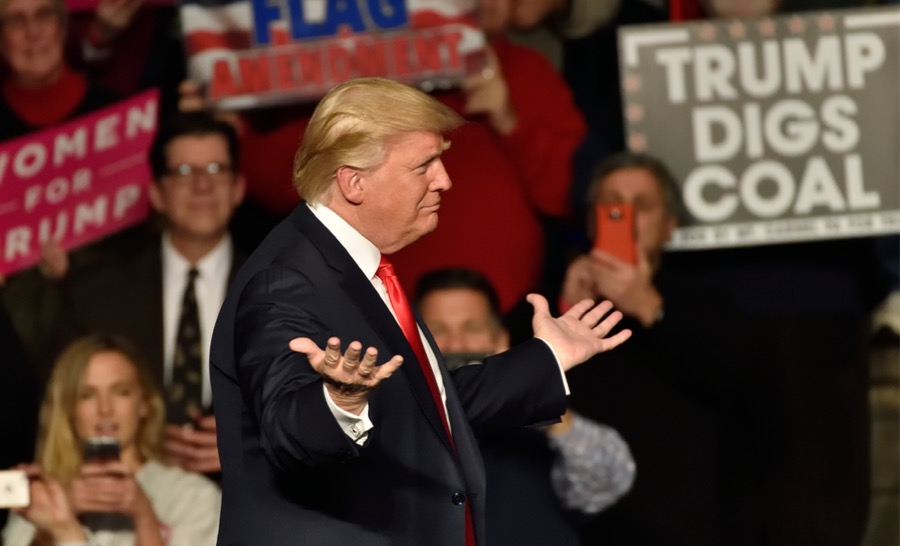So far that has not really equated, though, to putting coal miners back to work, something Trump has pledged to do again and again and again. There was a modest rise in coal mining employment starting in autumn 2016 — the product mainly of strong global demand for the hot-burning metallurgical coal used in steel manufacturing, which accounts for less than 10 percent of U.S. coal production — but it seems to have petered out.

Employment in coal mining is still up by 1,100 since last January, according to jobs data released Friday by the Bureau of Labor Statistics, but it’s down 1,000 since September. No big coal mining jobs comeback appears to be underway, then.
What there has been is a substantial and continuing resurgence in overall mining employment, which includes jobs in oil and gas extraction. You may remember Environmental Protection Agency chief Scott Pruitt trumpeting a 50,000-job gain in coal mining employment last June. What Pruitt meant — and he did eventually correct himself, although only after he was done making the rounds of the Sunday morning news shows — was that overall mining employment was up by 50,000 since October 2016. Now it’s up by 59,000.

Oil and gas extraction accounts for about 60 percent of all mining jobs, and 64 percent of the job gains since October 2016. This oil and gas industry boom, as my fellow Bloomberg View columnist Conor Sen pointed out earlier this month, was to a large extent the product of the 2014-2016 bust — caused by low oil and gas prices — that preceded it. Republican control of Congress and the White House is bringing more fossil-fuel-friendly policies that may lead to even more jobs in oil and gas production, but that’s been a mixed blessing for coal.
While there were certainly some anti-coal policies coming out of Washington during the previous administration, the single biggest reason for coal’s decline seems to have been the explosion in domestic natural gas production from shale fields. Overall U.S. natural gas production is up 61 percent since 2005. The Trump administration can undo that shift in the energy supply only if it’s willing to curtail either the production of natural gas or its use in electricity generation. Energy Secretary Rick Perry did try the latter with his proposal to force consumers of electricity to subsidize coal and nuclear plants in the name of a “reliable, resilient energy grid,” but a bunch of Trump appointees on the Federal Energy Regulatory Commission recently turned that down as expensive and impractical. Which leaves the nation’s former coal miners, of whom there must be several tens of thousands still of working age, waiting on that coal jobs boom.
In the great economic scheme of things, this really shouldn’t matter much. The U.S. economy added 200,000 jobs in January, or almost four times the total employment in coal mining. There are lots of other jobs out there.
Those new jobs are not, it is true, necessarily in the places where the coal mining jobs were. Trump’s fixation on bringing work back to the hard-luck coal regions in Western Pennsylvania and West Virginia where people responded with such enthusiasm to his campaign has at times bordered on endearing. He said he would fix it, and he really has been trying. Then again, if he can’t deliver on his promises, this is also pretty cruel. Reuters had a report a few months back about unemployed miners in Western Pennsylvania rejecting job-retraining classes because they’re expecting a big coal comeback. Still waiting.
The even bigger problem is that for someone who is supposed to be president of the whole country, going to extreme lengths to encourage coal mining makes for awful economic and environmental policy. It’s not just that coal mining accounts for a minuscule share of the nation’s jobs, or that most of the policy tools available for helping coal would end up raising prices for electricity users. It’s also just that coal isn’t, well, clean. According to a 2011 American Economic Review article by economists Nicholas Z. Muller, Robert Mendelsohn and William Nordhaus, using coal to generate electrical power is so dirty that it appears to detract from economic growth. That is, the pollution that burning coal generates — potential climate effects not included — causes so much economic damage that it outweighs the economic value of the electricity produced. That sure doesn’t sound like an equation for more jobs and faster growth.
This column does not necessarily reflect the opinion of the editorial board or Bloomberg LP and its owners.





Comments